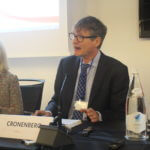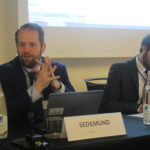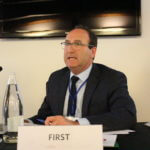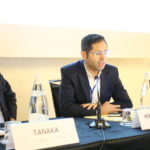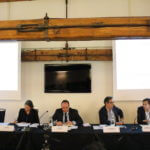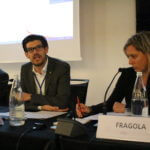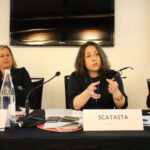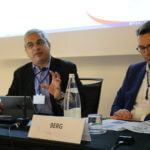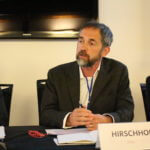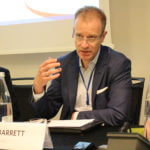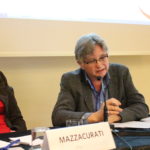Organized by Climate Policy Initiative (CPI) in collaboration with the World Bank Group, China Light Power (CLP) and the Organisation for Economic Co-operation and Development (OECD), and kindly hosted by Fondazione Eni Enrico Mattei, the Sixth Annual Meeting of the San Giorgio Group was held over one and a half days on the Island of San Giorgio Maggiore in Venice. The San Giorgio Group assembles key financial intermediaries and institutions actively engaged in green, low-emissions finance.
For further information on the San Giorgio Group, please contact: admin@cpivenice.org.
Monday, 8 May 2017
Welcome
Carlo Carraro, Scientific Director, Fondazione Eni Enrico Mattei (FEEM) / Director, International Center for Climate Governance (ICCG)
Barbara Buchner, Executive Director, CPI Climate Finance
Introductory Panel: Tracking & Politics
The introductory session focused on developments, milestones, and challenges that have impacted climate financing over the past year. Panelists will identify the important political milestones up to and beyond 2020 to keep the Paris Agreement on track. On the public side, how will technical work to improve information flows, policies and financial instruments enable countries and investors to take ambitious climate action? On the private side, how will investor initiatives to improve information on finance flows enhance their participation in the implementation of NDCs? What needs to be done to augment private investor action and interaction with the landscape of public climate finance actors?
Chair: Jane Ebinger, Director of Policy, Sustainable Energy for All
Panelists:
- Carel Cronenberg, Principal MRV Manager, Energy Efficiency & Climate Change Team, European Bank for Reconstruction and Development
- Adeline Dontenville, REDD Expert, EU REDD Facility, European Forest Institute
Presentation: The Value of National Climate Finance Tracking for NDC Implementation - Mafalda Duarte, Manager, Climate Investment Funds
- Jens Sedemund, Senior Advisor, Statistics and Development Finance Division, Development Co-operation Directorate, Organisation for Economic Co-operation and Development
- B. Buchner
- C. Cronenberg
- J. Sedemund
Panel: Green Banks in Emerging Markets and the Evolution of the Climate Finance Architecture
A sustainable approach to low-carbon finance requires engaging and channeling local savings toward low-carbon infrastructure domestically while also increasing national ownership. In this context, national green investment banks (GIBs) in emerging markets could be an important part of the evolving climate finance architecture. GIBs may offer a replicable model for moving the locus of problem-solving and agency to the national level while empowering developing countries to benefit from international financial resources. Panelists will explore this hypothesis and broader questions of how the overarching climate finance architecture must evolve to become more coherent and fit for purpose.
Chair: Paul Bodnar, Managing Director, Rocky Mountain Institute
Presentation: The Global Climate Finance Architecture
Panelists:
- Andrea Colnes, International Director, Coalition for Green Capital
Presentation: Speed, Scale & Local Solutions: National Green Banks in Developing Nations - Jonathan First, Head of Syndication Finance, Development Bank of Southern Africa (DBSA)
- Josué Tanaka, Managing Director, Operational Strategy and Planning, Energy Efficiency and Climate Change, European Bank for Reconstruction & Development
- Leonardo Martinez-Diaz, Global Director, Sustainable Finance Center, World Resources Institution
Presentation: Green Financial Institutions: Considerations for Developing Countries -
- A L. Colnes
- J. First
- J. Tanaka
- L. Martinez-Diaz
Panel: Overcoming Cities’ Constraints in Raising Finance for Climate Action
According to the Compact of Mayors, 639 cities have committed to developing climate mitigation and adaptation plans, with 318 located in developing countries. The ability of cities to develop and finance these plans is constrained by a number of factors, including lack of expertise, lack of capacity, and limited access to finance. If lack of creditworthiness does not preclude a city from raising finance directly, they may nevertheless be prohibited by regulation. How can international public climate finance, philanthropic support and grassroots city-led initiatives help municipal governments and other urban actors source the funding they need to implement their climate plans? Panelists will share insights on efforts to match investment with city-based projects and discuss the potential of municipal bonds and other options for bridging the urban climate finance gap.
Chair: Padraig Oliver, Senior Analyst, CPI Climate Finance
Presentation: Understanding the Channels to Help Cities Access Green Bond Market Flows
Panelists:
- James Alexander, Head, Finance and Economic Development Initiative, C40 Initiative
- Cristiana Fragola, Director of Partnerships, Global Covenant of Mayors
- Sean Kidney, CEO, Climate Bonds Initiative
- Monica Scatasta, Head of Environment, Climate and Social Policy, European Investment Bank
- Michael Schneider, Ecconoa Impact Entrepreneur and Member of the Supervisory Board of GRIPS AG Energy Service Company
- Nick Godfrey, Director, Coalition for Urban Transition
Presentation: Coalition for Urban Transitions: A New Climate Economy Special Initiative
-
- J. Alexander
- M. Scatasta
- M. Schneider
Panel: Exploring Promising Financial Instruments to Unlock Additional Finance
While most recent data shows an increase in global climate finance flows, volumes remain far below even the most conservative estimates of financing needs for a 2-degree pathway. This session focuses on the role of different instruments and actors that can unlock significant private climate investment if deployed at scale, by targeting specific risks that are most prevalent to private investors. Panelists will highlight how different financial instruments and actors can target private capital to support green investments.
Chair: Vikram Widge, Head, Climate Finance & Policy, International Finance Corporation (IFC), The World Bank Group
Panelists:
- Martin Berg, Investment Officer, Infrastructure Funds and Climate Action, Equity, New Products and Special Transactions, European Investment Bank
Presentation: Exploring Promising Financial Instruments to Unlock Additional Finance - Matthias Börner, GCF Key Account Manager and Senior Economist, KfW Development Bank / KFW Bankengruppe
- Harald Hirschhofer, Head of Research, TCX – The Currency Exchange Fund
- Assaad W. Razzouk, Group Chief Executive Officer, Sindicatum Sustainable Resources
- Agustin Silvani, Vice President, Conservation Finance at Conservation International
-
-
- V. Widge
- H. Hirschhofer
Closing remarks by Barbara Buchner, Executive Director, CPI Climate Finance
Social Dinner
Dinner remarks on “The Advisory Finance Group – enabling economic growth while reducing climate risk”
-
-
- Thomas C. Heller, Chairman of the Board, Climate Policy Initiative
-
Tuesday, 9 May 2017
Panel: From Risk Disclosure to Action
Understanding the various risks and opportunities associated with climate change, as well as the shifting preferences of shareholders and consumers is key to informing capital allocation decisions. Many corporations have already begun to recognize exposure to climate risks in their supply chains and business operations. Nonetheless, suitable tools and incentives to measure and incorporate climate risks remain scarce, and existing climate intelligence services are limited in use. Panelists will discuss to what extent the evolving recognition and commitment from the private sector lead to effective game-changing actions. What challenges remain to meaningfully mainstream climate risk into business operations? How can new approaches and financial mechanisms help develop the market for climate intelligence solutions?
Chair: Chiara Trabacchi, Inter-American Investment Corporation, IADB
Panelists:
- Chris Barrett, Executive Director Finance & Economics, European Climate Foundation
- Remco Fischer, Programme officer – Climate Change, UNEP Finance Initiative
- Jay Koh, Managing Director, The Lightsmith Group
- Emilie Mazzacurati, Founder and Chief Executive Officer, Four Twenty Seven
- David Simmons, Managing Director, Willis Capital, Science and Policy Practice, Willis Group
-
-
- C. Barrett
- D. Simmons
Concluding Panel: How to Accelerate the Implementation of NDCs?
This session discusses the types of support countries need to create the enabling conditions to mobilize finance for effective NDC implementation. How to create the legal and policy frameworks to encourage investment? How can innovative financial instruments improve the risk-return ratio for investors, and how to ensure that they are actionable and replicable at scale? How to support the development of robust pipelines of bankable projects in key sectors and access to finance? Panelists will discuss how legal, policy reforms, innovative financial instruments, and strong investment opportunities can unlock public and private investment at scale. The session will conclude by providing an outlook on necessary next steps to finance the implementation of the Paris Agreement and contribute to bridging the investment gap.
Chair: Norbert Goriβen, Head of International Climate Finance, Federal Ministry for the Environment, Nature Conservation, Building and Nuclear Safety, Germany
Panelists:
- Pacifica F. Achieng Ogola, Director Climate Change Programmes Coordination Directorate of Climate Change, State Department of Environment, Kenya Ministry of Environment and Natural Resources
- Paula Henry, Senior Project Manager, Infrastructure Unit, AECOM International Development Europe
- Ricardo Nogueira, Independent Climate Finance Expert
- William Tyndall, CEO, CCAP
Presentation: Clean Energy for NDCs: Scaling Up Private Financing - Henning Wuester, Director – Knowledge, Policy and Finance Centre, International Renewable Energy Agency (IRENA)
-
- Closing of the meeting by Barbara Buchner, Executive Director, CPI Climate Finance
-






